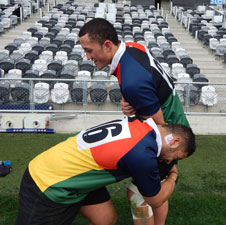 Thursday 25 August 2016 8:48am
Thursday 25 August 2016 8:48am
University researchers are testing whether neck strength is a crucial factor in preventing concussion in rugby.
The University of Otago is conducting ground-breaking research in to the forces exerted on heads of the Otago rugby players as they compete during the Mitre 10 Cup on Thursday, 25 August. The University researchers are testing whether neck strength is a crucial factor in preventing concussion in the sport.
With the support of New Zealand Rugby and all 23 players in the Otago Mitre 10 team playing in the Cup, researchers from Otago's South Island Brain Injury Research Group will seek to examine the relationship between head impacts and neck strength. Each player will wear an electronic device, no bigger than a $2 coin, behind their ear, during five Otago home games this season.
Research Fellow from Otago's School of Physical Education and Exercise Sciences Dr Danielle Salmon says this has never been done at semi or professional player level in New Zealand, but it has been conducted on American Football, where it was found that increased neck strength could reduce the likelihood that a player would sustain concussion.

Dr Danielle Salmon
“We hope to improve knowledge about concussion in New Zealand, a major medical concern in contact/collision-based sports at all ages and levels of competition.
“Starting during Thursday night's opening game against Wellington at the Forsyth Barr Stadium, the players will wear a CSx Head Positioning System, a small accelerometer that attaches behind the player's ear and measures linear and rotational acceleration forces experienced at the head during impact events such as the tackle of ruck,” she says.
New Zealand Rugby Medical Director Ian Murphy said the outcome of the research could provide a unique perspective of the implications for the prevention and detection of concussion in rugby.
“Collecting data from players involved in one of our most competitive rugby competitions – the Mitre 10 Cup - has the potential to provide vital information in helping determine which players are most at risk from blows to the head or body that may contribute to concussion.
“We're grateful to Otago Rugby and the team at the University of Otago for their innovative approach to this research and for working with us as we continue to learn more about concussion.”
Dr Salmon says in addition to neck strength, the research team, led by Dr Hamish Osborne from the Dunedin School of Medicine, is also measuring neurocognitive function of the players pre and post-season, using standardised questionnaires and on-line assessments developed by a BrainHQ from Posit Science, a company that specialises in improving neuroplasticity through the use of brain training.
“We will use this head impact data collected during the season and will compare this to any changes that are observed in neurocognitive function over the season to see if there is a relationship between the two,” she says.
For more information, contact:
Dr Hamish Osborne
Dunedin School of Medicine
Email: hamish.osborne@otago.ac.nz
Dr Danielle Salmon
School of Physical Education and Exercise Sciences
Email: danielle.salmon@otago.ac.nz
A list of Otago experts available for media comment is available elsewhere on this website.
Electronic addresses (including email accounts, instant messaging services, or telephone accounts) published on this page are for the sole purpose of contact with the individuals concerned, in their capacity as officers, employees or students of the University of Otago, or their respective organisation. Publication of any such electronic address is not to be taken as consent to receive unsolicited commercial electronic messages by the address holder.
